MarinTrust's side event at the IFFO Lisbon Annual Conference was held on 22 October and featured:
- Øyvind Ihle, CEO, Global Sustainable Seafood Initiative (GSSI)
- Lindsay Pollock, Global Sourcing Sustainability Lead, BioMar Group
- Lief Hendrikz, EMEA Market Development Manager, Global Dialogue for Seafood Traceability (GDST)
- Andres Daroch, CEO - FoodCorp Chile S.A.
- Francisco Aldon, CEO, MarinTrust, moderator
Opening the event, Francisco Aldon, CEO of MarinTrust, set the scene by noting that demand is increasing for assured marine ingredients from across the value chain, especially from investors. Country and regional legislation is also driving demand and increasing levels of certification across fisheries. Aldon added that it is important to understand how these demands are putting pressure on producers and their value chain. The availability of marine ingredients is challenging, due to certified material being sold to areas that do not require it resulting in the certification being lost, and uptake to the Improver Programme is a long-term investment and requires support from the value chain. What links the value chain is information, that has to travel from start to end.
Feed demands
BioMar Group’s Global Sourcing Sustainability Lead Lindsay Pollock presented the demands from a feed producer perspective. In terms of priorities, the top is feed safety, focusing on making the factory environment fit for purpose. This is followed by BioMar’s and their customers’ sustainability ambitions. For marine ingredients, BioMar wants assurance that the ingredients are from non IUU sources, and that traceability and visibility is growing within the supply chains. Regarding due diligence, it is simply about managing risk within a business, and to do it well we need transparency in supply chain, identifying and preventing areas of risk, including human rights risks. This action is not just happening in the EU, but is spreading beyond. Pollock noted that it is key to build both trust and social license in marine ingredients, it is one of the most high profile ingredients in this area and farmers are now asking for more information.
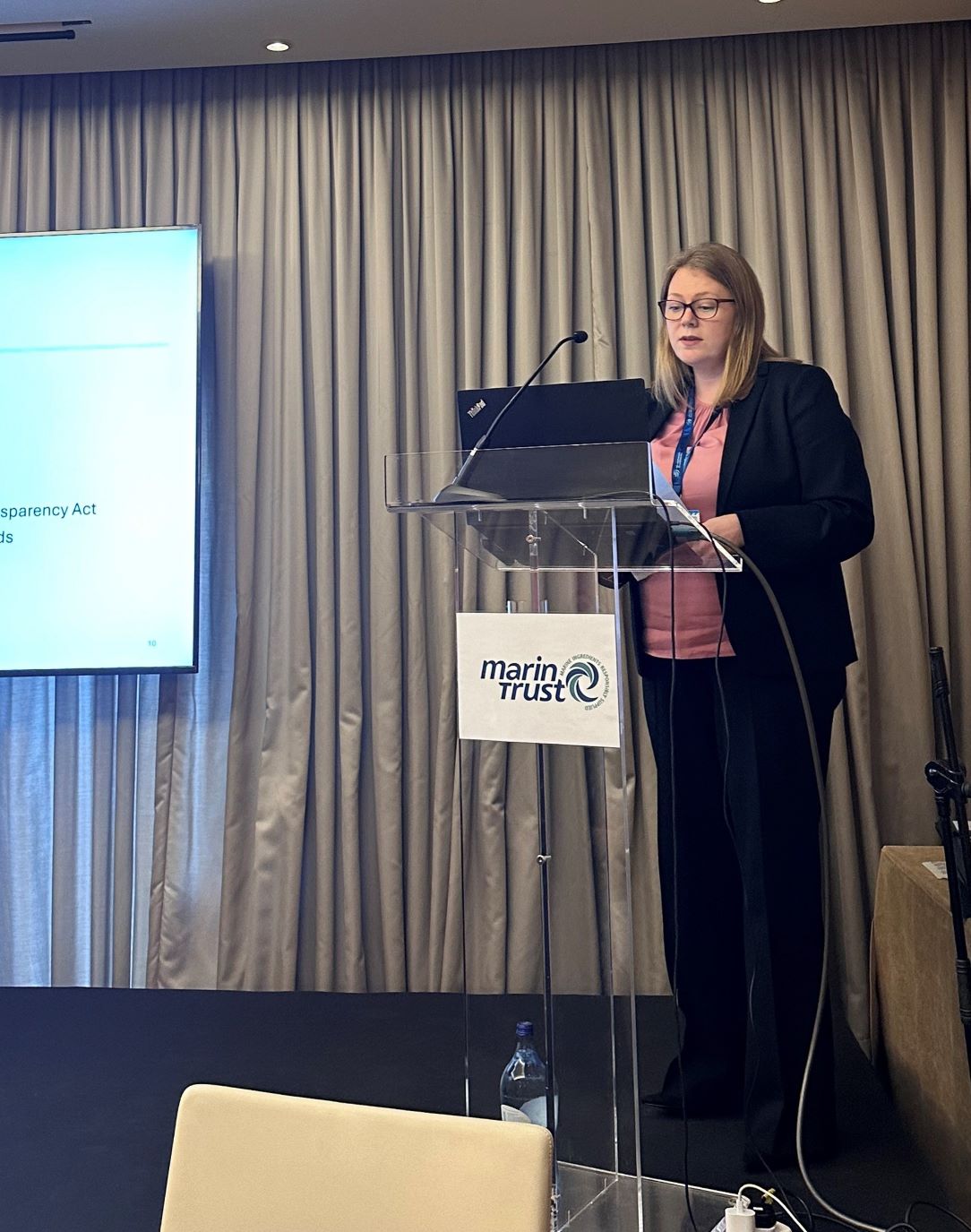
“It is vital that as an industry we communicate complexity, simply. We need to have the detailed information so that we can communicate down the value chain to our customers. Even if your customers aren’t asking for certification, it is good to move ahead and prepare for the future.” Pollock added that “the certification space is crowded and while all these certifications have a role to play, MarinTrust have brought together other standards within marine ingredients to reduce the audit burden, but we need to retain the integrity of the Standard at the same time.”
How benchmarking certification schemes helps
Øyvind Ihle, the CEO of the Global Sustainable Seafood Initiative (GSSI) introduced the partnership, which aims to expand credible certifications by benchmarking schemes against FAO guidelines. Ihle presented the surprising benefits of certifications, noting that it is not just a check mark for market access but about the management of fisheries. From a commercial lens, there are some surprising business benefits, but “certified marine ingredients are not increasing, and we all need to work together to change this. We need to anticipate where the market is heading and certification is a tool of where the market is going to be. Be proactive not reactive!”.
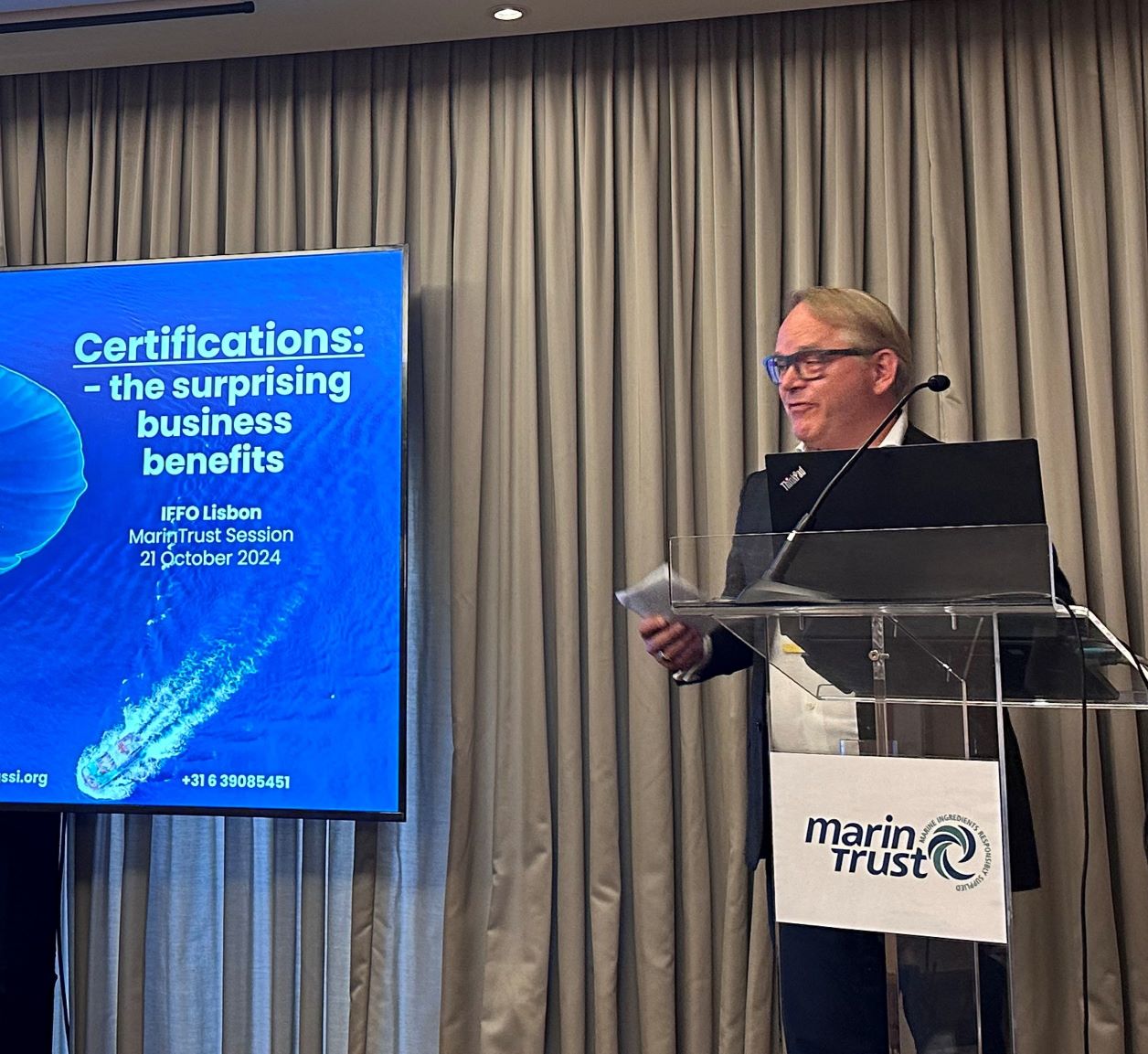
Ihle gave an overview of the benefits of certification, starting with risk reduction through certifications, better insulating businesses from market regulatory shifts. Risks are both operational and reputational, with a good an example of impactful regulation happening in the US in 2026, when the FDA will require companies to supply complete traceability information on imported farmed fish. Another benefit is operational excellence, which businesses benefit from as they go through the certification process by discovering ways to become more efficient and reducing liability in operations. Lastly, companies benefit through brand leadership, marine ingredients are a commodity and through certification companies can be seen as a leader and benefit from brand loyalty.
Standardising the data
Focusing on how to enable traceability, Lief Hendrikz, the EMEA Market Development Manager from Global Dialogue for Seafood Traceability (GDST) opened by saying that “we are living in the Digital Age, or the fourth industrial revolution. And yet, data relating to ethical, responsible, safe and sustainable practices in seafood supply chains is often paper based, shared manually via fragmented systems working in silo, and demands for data from governments, buyers and NGOs are inconsistent. This causes masses of duplicated effort, hampers and delays trade, causes higher resource costs, higher compliance costs, which magnifies across the whole of the value chain.” The GDST Standard supports better efficiencies and cost savings in businesses across the seafood supply chain. The core mission of GDST is to increase the visibility in our seafood supply chains to enable action on issues that affect the future health of our fish stocks, oceans, our ability to provide nutritious food for a growing population. Aldon added that MarinTrust is also working hard to widen the scope of recognition to increase access.
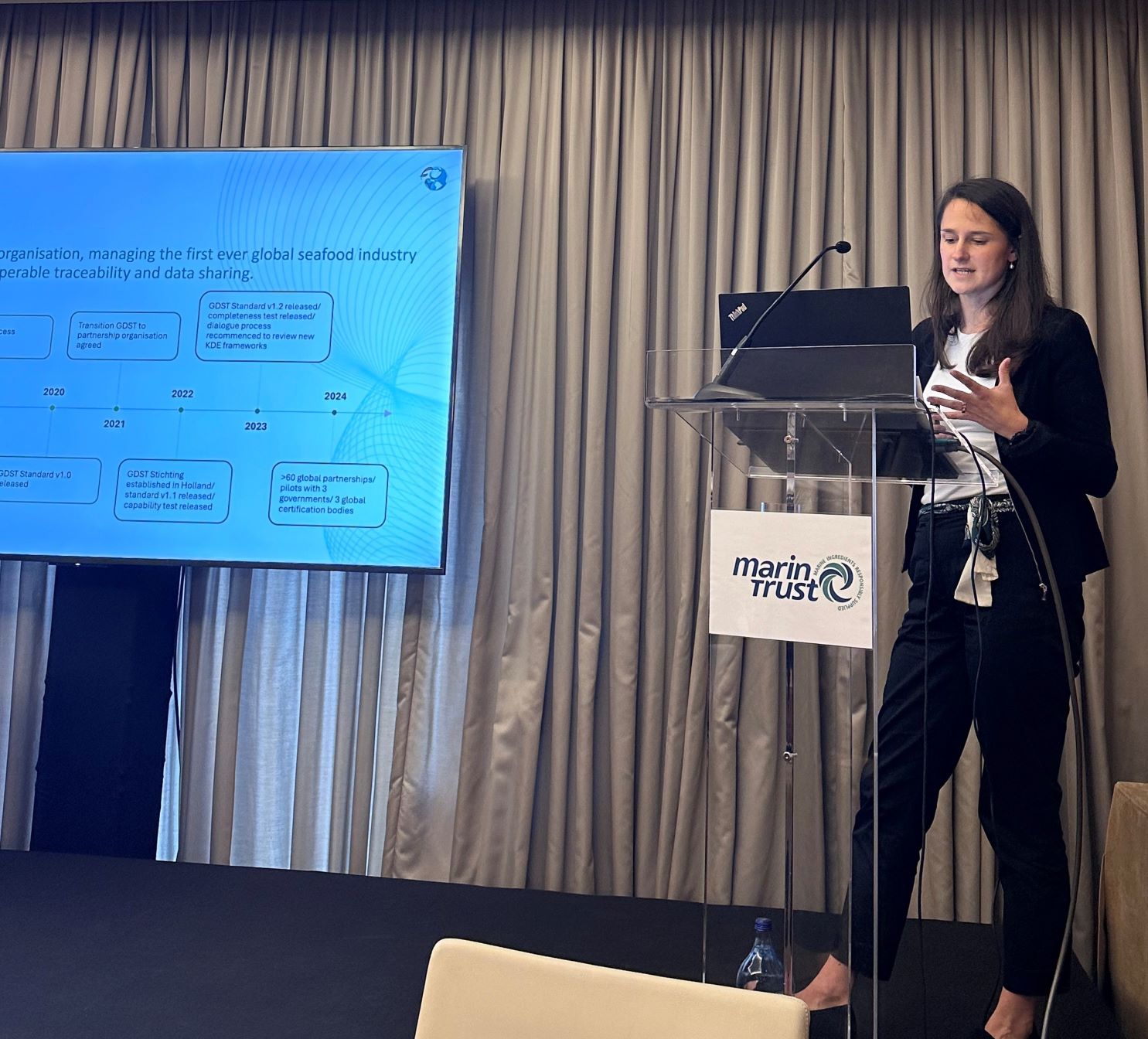
MarinTrust recognises the opportunity presented by the GDST Standard for the marine ingredient sector, which is complex, with raw materials coming from multiple sources and fragmented data sources. Version 3 of MarinTrust’s Factory Standard includes GDST Key Data Elements, requiring traceability down to batch/delivery of raw materials, and strengthened traceability at all stages of production. Earlier this year MarinTrust supported a new expansion framework for Key Data Elements relating to marine feed ingredients through the GDST Dialogue process, which are expected to be finalised next year. MarinTrust plays a key role in the marine ingredient value chain, but collaboration across actors from all stages of the chain is necessary for success. Hendrikz ended by calling on business to partner with GDST to show their support for a data standard for digital interoperable traceability for seafood supply chains.
The reality from marine ingredient producers
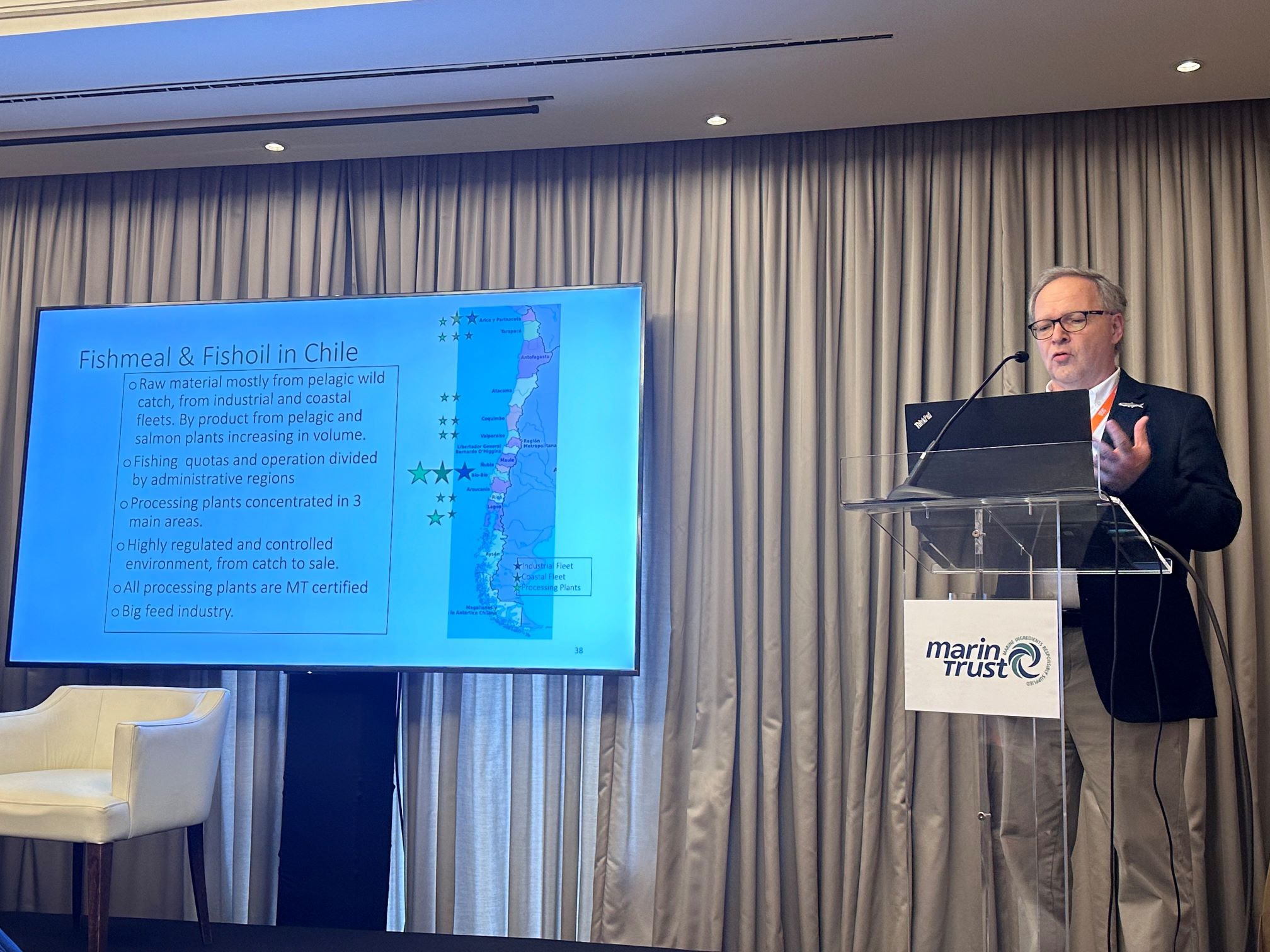
Giving the perspective from a fishmeal and fish oil producer, Andres Daroch presented on behalf of FoodCorp Chile. In Chile, marine ingredient sources are from both industrial and coastal fleets, and salmon by-products. All FoodCorp’s processing plants are certified and operating in a very regulated environment, starting with the vessels to the factory, with a compliance intensive environment. This high level of compliance has made it easier to gain access to certification, but at the same time it can create resistance to more levels of checks for further certification. Daroch noted that it has taken a lot of effort to get and retain certification. A hard step was to ensure government validation was also recognised by MarinTrust, but this has also helped the government’s understanding of the Standard. Daroch recommended that the standardisation of audits continue and that there is more integration between standards. Regarding ASC’s feed ladder, he asked for the industry to work all together and create a process that is more inclusive. "Our company's workers see MarinTrust as a plus and it has helped create trust with our clients and many are asking for it. We see that the drive for certification coming from the consumers and MarinTrust is becoming less voluntary and more a must."
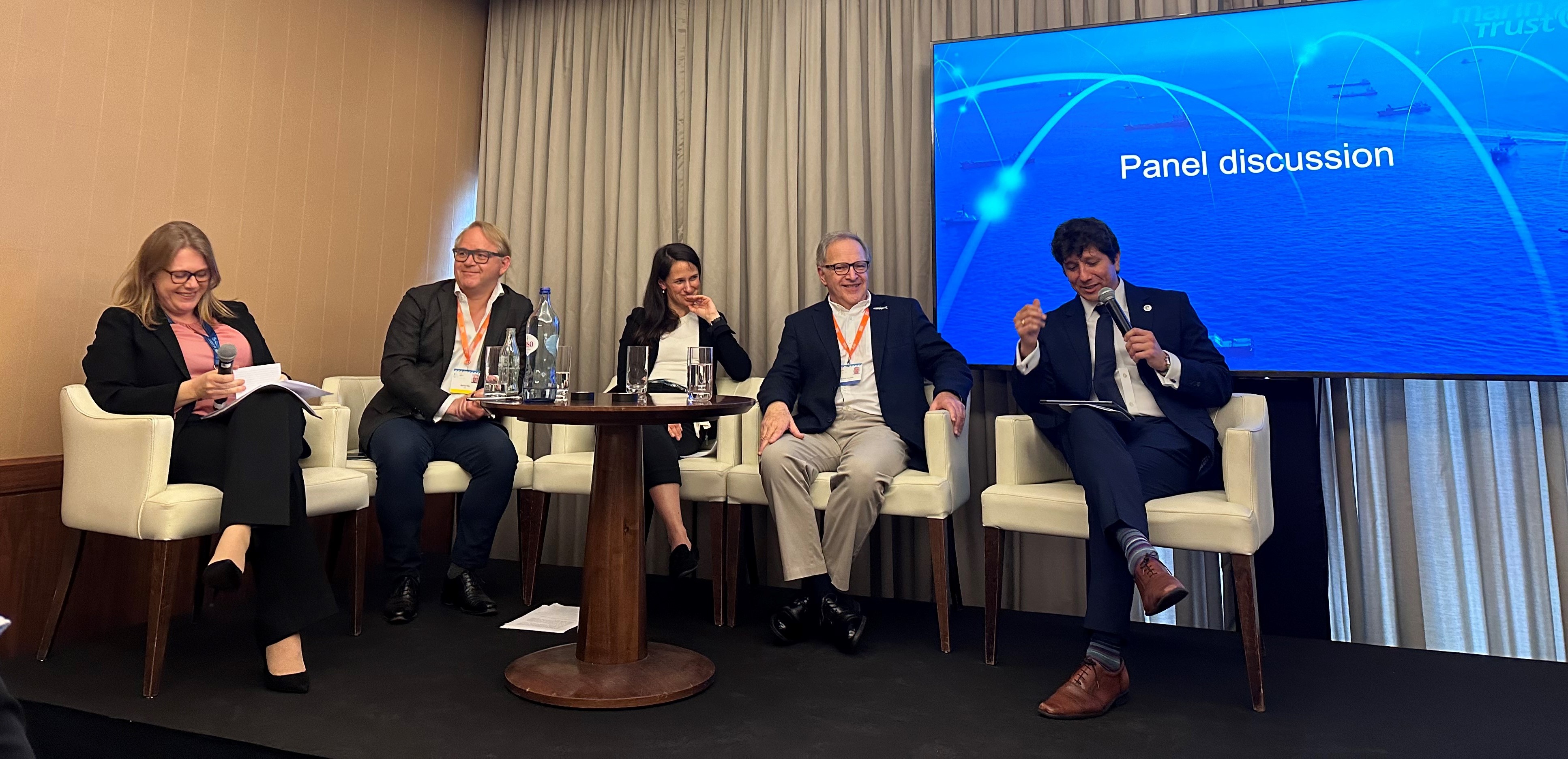
Noting that there has been a lot of work on traceability, panellists stated that challenges are remaining. "Data is not the problem: we have too much data. The issue is with the management of that data. Data is fragmented in businesses. Another challenge lies in systems. Let’s get our systems interoperable, make our lives much easier" Leif Hendrikz concludes.
Panelists agreed on the importance of collaboration and increased recognition between standards with the objective of increasing accessibility, improved efficiency and reduction duplication of efforts, and increased availability of assured marine ingredients.
Aldon closed the event by noting that “Certification is the answer not the obstacle, we are talking between us to enable business and build a versatile and resilient industry.”
